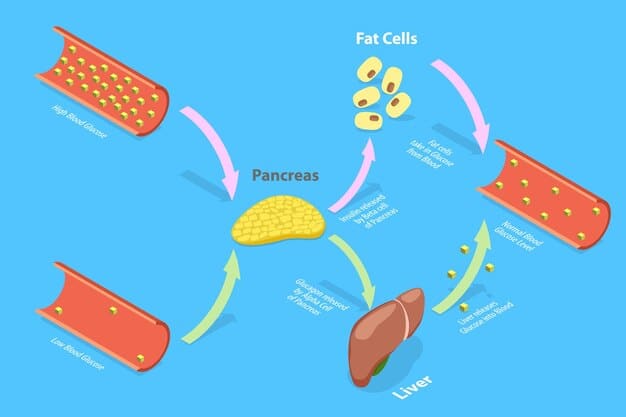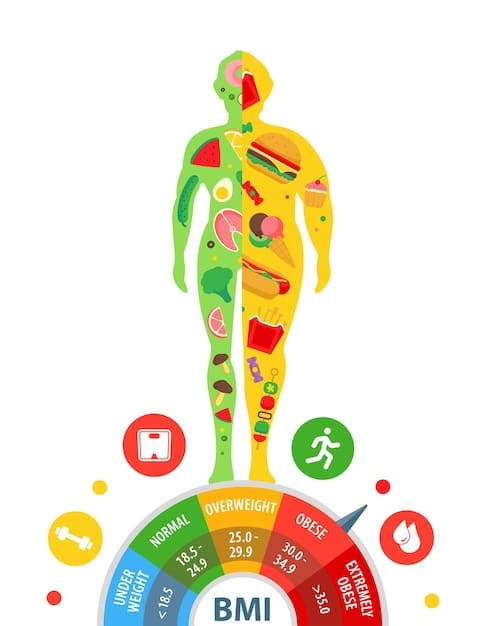Understanding Ketogenesis: The Science Behind Keto and Weight Loss

Understanding the science of ketogenesis involves exploring how a ketogenic diet shifts the body’s metabolism to burn fat for fuel, leading to weight loss and other physiological changes.
Embarking on a ketogenic journey? Understanding the science of ketogenesis: How a ketogenic diet affects metabolism and weight loss is key to unlocking its full potential. Let’s dive into the science and transform your weight loss journey!
What is Ketogenesis? Unveiling the Metabolic Process
Ketogenesis is a metabolic process that occurs when the body doesn’t have enough glucose (sugar) for energy. Instead, it starts breaking down stored fat into molecules called ketone bodies, which become the primary fuel source. This process is the cornerstone of the ketogenic diet, a dietary approach designed to induce and maintain ketosis.
The Role of Insulin
Insulin, a hormone produced by the pancreas, plays a crucial role in regulating blood sugar levels. When carbohydrate intake is high, insulin transports glucose from the bloodstream into cells for energy or storage. However, when carbohydrate intake is drastically reduced, as in a ketogenic diet, insulin levels drop. This decrease in insulin signals the body to start breaking down fat stores for energy through ketogenesis.
Ketone Bodies: The Alternative Fuel
Ketone bodies are molecules produced by the liver from fatty acids during periods of low carbohydrate intake or fasting. The three main ketone bodies are acetoacetate, beta-hydroxybutyrate (BHB), and acetone. These molecules can be used by various tissues in the body, including the brain, as an alternative fuel source to glucose. Understanding how these ketone bodies function is essential to grasp the metabolic shift that occurs during ketogenesis.

- Acetoacetate: The first ketone body produced during ketogenesis.
- Beta-Hydroxybutyrate (BHB): The most abundant ketone body in the blood, used efficiently by the body for energy.
- Acetone: A less abundant ketone body, some of which is exhaled, causing a fruity odor on the breath, often referred to as “keto breath”.
In summary, ketogenesis is a powerful metabolic adaptation that allows the body to thrive even when carbohydrate availability is limited. By understanding the process and the role of ketone bodies, one can better appreciate the workings of a ketogenic diet and its potential benefits.
The Ketogenic Diet: Inducing Ketosis Through Nutrition
The ketogenic diet is a high-fat, very-low-carbohydrate dietary approach designed to shift the body’s primary fuel source from glucose to ketone bodies. This nutritional strategy forces the body into a state of ketosis, where it efficiently burns fat for energy, leading to various metabolic and physiological changes.
Macronutrient Ratios
A typical ketogenic diet consists of approximately 70-80% of calories from fat, 20-25% from protein, and only 5-10% from carbohydrates. This macronutrient ratio is crucial for maintaining ketosis, as excessive carbohydrate intake can quickly halt ketone production. The focus is on consuming fats like avocados, olive oil, nuts, and fatty meats while strictly limiting carbohydrates from sources like grains, starchy vegetables, and fruits.
Foods to Eat and Avoid
Foods to emphasize on a ketogenic diet include non-starchy vegetables (such as leafy greens and broccoli), healthy fats (such as avocados, olive oil, and coconut oil), and moderate amounts of protein (such as meat, poultry, and fish). Conversely, foods to avoid include grains, starchy vegetables (such as potatoes and corn), sugary fruits, and processed foods high in carbohydrates.
Tracking Carbohydrate Intake
To maintain ketosis, it’s essential to track daily carbohydrate intake. Most individuals on a ketogenic diet aim to consume fewer than 50 grams of net carbohydrates per day, with some aiming for as low as 20 grams. This careful tracking helps ensure that the body remains in a state where fat is being used as the primary fuel source.
- Prioritize Healthy Fats: Incorporate sources like avocados, olive oil, and nuts.
- Limit Carbohydrates: Strictly avoid grains, sugars, and starchy vegetables.
- Moderate Protein Intake: Consume adequate protein to preserve muscle mass.
Adhering to these dietary principles is crucial for successfully inducing and maintaining ketosis. By carefully managing macronutrient ratios and food choices, individuals can shift their metabolism to burn fat for fuel, realizing the intended effects of the ketogenic diet.
Metabolic Adaptations: How the Body Changes on Keto
When the body transitions to a ketogenic diet, significant metabolic adaptations occur. These changes impact energy utilization, hormone regulation, and overall physiological function. Understanding these adaptations is essential for optimizing the ketogenic experience and mitigating potential side effects.
The Initial Phase: Keto-Adaptation
During the first few weeks of starting a ketogenic diet, the body undergoes a period of keto-adaptation. This phase involves the liver increasing its production of ketone bodies, and tissues throughout the body learning to use these ketones as fuel. Consequently, some individuals may experience the “keto flu,” characterized by fatigue, headaches, and brain fog. This phase is temporary but can be managed with proper hydration, electrolyte supplementation, and adequate rest.
Improved Insulin Sensitivity
One of the most notable metabolic benefits of a ketogenic diet is improved insulin sensitivity. By reducing carbohydrate intake, the demand on insulin decreases, allowing cells to respond more effectively to the hormone. This can lead to better blood sugar control and reduced risk of insulin resistance, which is a precursor to type 2 diabetes.
Fat Oxidation and Energy Metabolism
As the body becomes more efficient at using fat for fuel, fat oxidation increases. This means the body burns more fat throughout the day, even at rest. The increased fat oxidation supports weight loss and can provide a sustained source of energy. This metabolic shift can also result in improved mental clarity and focus, as the brain adapts to using ketone bodies as its primary fuel.

- Electrolyte Balance: Ensure adequate intake of sodium, potassium, and magnesium to counter electrolyte imbalances.
- Hydration: Drink plenty of water to avoid dehydration, especially during the initial keto-adaptation phase.
- Gradual Transition: Ease into the ketogenic diet slowly to minimize the effects of the keto flu.
Overall, the metabolic adaptations that occur on a ketogenic diet can result in improved metabolic health, weight loss, and enhanced energy levels. By understanding these changes and managing the transition effectively, individuals can reap the benefits of this unique nutritional approach.
Weight Loss on Keto: The Science Behind the Results
The ketogenic diet has gained popularity as an effective weight loss strategy, largely due to its impact on metabolism and appetite regulation. By shifting the body’s primary fuel source from carbohydrates to fats, the ketogenic diet triggers a series of physiological responses that can promote significant weight loss.
Reduced Calorie Intake
One of the primary mechanisms through which the ketogenic diet promotes weight loss is by naturally reducing calorie intake. High-fat foods are more satiating than carbohydrates, leading to a decrease in hunger and overall food consumption. Additionally, the strict limitation of carbohydrates and processed foods helps eliminate many high-calorie, nutrient-poor options from the diet.
Increased Fat Burning
The ketogenic diet forces the body to become highly efficient at burning fat for energy. When carbohydrate intake is low, the body turns to its fat reserves, breaking them down into fatty acids and ketone bodies. This process, known as ketogenesis, not only provides an alternative fuel source but also helps reduce overall body fat percentage.
Appetite Regulation
Ketone bodies, particularly beta-hydroxybutyrate (BHB), have been shown to have appetite-suppressing effects. By increasing the levels of ketone bodies in the blood, the ketogenic diet can help reduce cravings and hunger, making it easier to adhere to a reduced-calorie diet. This appetite regulation is a key factor in the diet’s long-term success for weight loss.
The Role of Hormones
The ketogenic diet influences several hormones involved in weight regulation. It lowers levels of insulin, which can promote fat storage, and increases levels of hormones such as leptin and ghrelin, which help regulate appetite. This hormonal balance contributes to the diet’s effectiveness in promoting weight loss.
In conclusion, the weight loss benefits of the ketogenic diet stem from a combination of reduced calorie intake, increased fat burning, and improved appetite regulation. Understanding these mechanisms can help individuals optimize their ketogenic journey for the best possible weight loss results.
Potential Benefits: Beyond Weight Loss
While the ketogenic diet is well-known for its weight loss benefits, it offers a range of other potential health advantages. These include improvements in blood sugar control, brain health, and potential therapeutic applications for certain medical conditions. Exploring these benefits can provide a more comprehensive understanding of the ketogenic diet’s impact on overall health.
Improved Blood Sugar Control
The ketogenic diet can be particularly beneficial for individuals with type 2 diabetes or insulin resistance. By drastically reducing carbohydrate intake, the diet helps lower blood sugar levels and reduce the need for insulin. Studies have shown that the ketogenic diet can lead to significant improvements in HbA1c levels, a marker of long-term blood sugar control, and may even allow some individuals to reduce or eliminate their diabetes medications.
Brain Health and Cognitive Function
Ketone bodies can serve as an alternative fuel source for the brain, potentially offering neuroprotective benefits. Some research suggests that the ketogenic diet may improve cognitive function, memory, and focus. It has also been explored as a therapeutic intervention for neurological conditions such as Alzheimer’s disease and epilepsy.
Therapeutic Applications
In addition to its benefits for diabetes and neurological conditions, the ketogenic diet has shown promise in the management of other health issues. For example, it has been investigated as a potential treatment for certain types of cancer, as cancer cells often rely on glucose for energy and may not be able to thrive in the absence of glucose when ketones are present.
- Epilepsy Management: The ketogenic diet has been used for decades to control seizures in children with epilepsy.
- Improved Cholesterol Levels: Some studies suggest the ketogenic diet can improve cholesterol levels, reducing triglycerides and increasing HDL cholesterol.
- Potential Cancer Therapy: Research is ongoing to evaluate the ketogenic diet’s role in cancer prevention and treatment.
In summary, the ketogenic diet extends beyond weight loss. Its impact on blood sugar control, brain health, and potential therapeutic applications highlight its broader significance in promoting health. While more research is needed, the ketogenic diet shows promising potential for diverse health conditions.
Navigating the Challenges: Side Effects and Considerations
While the ketogenic diet offers numerous potential benefits, it’s important to be aware of the challenges and potential side effects associated with it. Understanding these considerations can help individuals navigate the diet more effectively and mitigate any adverse effects.
The “Keto Flu”
One of the most common side effects experienced during the initial phase of the ketogenic diet is the “keto flu.” This condition is characterized by symptoms such as fatigue, headaches, nausea, and irritability, and is caused by the body adapting to using ketones as its primary fuel source. The keto flu is usually temporary and can be managed by staying hydrated, supplementing with electrolytes, and ensuring adequate rest.
Nutrient Deficiencies
The ketogenic diet restricts many foods, particularly fruits and grains, which can lead to nutrient deficiencies if not carefully managed. It’s essential to consume a variety of nutrient-dense, keto-friendly foods and consider supplementing with vitamins and minerals such as vitamin D, magnesium, and potassium to avoid deficiencies.
Digestive Issues
Some individuals may experience digestive issues such as constipation or diarrhea when starting a ketogenic diet. This can be due to changes in fiber intake and gut bacteria. Ensuring adequate fiber intake through non-starchy vegetables and considering probiotic supplements can help alleviate these digestive problems.
- Electrolyte Imbalance: Monitor and replenish electrolytes to avoid symptoms like muscle cramps and fatigue.
- Fiber Intake: Consume non-starchy vegetables to support digestive health.
- Hydration: Drink plenty of water to mitigate dehydration and constipation.
In conclusion, navigating the challenges of the ketogenic diet involves being aware of potential side effects and taking proactive steps to mitigate them. By addressing issues like the keto flu, nutrient deficiencies, and digestive problems, individuals can make the ketogenic diet a more sustainable and enjoyable lifestyle choice.
Consulting Healthcare Professionals Before Starting Keto
Before embarking on a ketogenic diet, it is crucial to consult with healthcare professionals, especially if you have any pre-existing medical conditions. Personalized guidance ensures the diet is safe and suitable for your individual health needs.
Addressing Pre-existing Conditions
Individuals with conditions such as diabetes, kidney disease, or cardiovascular issues should seek advice from their doctor or a registered dietitian. The ketogenic diet can significantly impact these conditions, and adjustments to medication or careful monitoring may be necessary.
Customizing the Diet to Individual Needs
Healthcare professionals can help tailor the ketogenic diet to meet specific nutritional requirements. They can provide guidance on appropriate macronutrient ratios, supplements, and strategies for managing potential side effects, ensuring the diet is both safe and effective.
Monitoring and Adjustments
Regular check-ups with healthcare providers during the ketogenic diet can help monitor key health markers and make necessary adjustments. This ongoing support ensures the diet continues to align with your health goals and minimize any potential risks.
- Blood Sugar Levels: Regular monitoring is essential for individuals with diabetes.
- Kidney Function: Those with kidney issues should monitor their kidney health closely.
- Overall Health Markers: Routine check-ups can help identify any potential concerns early on.
In summary, consulting healthcare professionals before starting a ketogenic diet is a critical step. Their expertise ensures the diet is safe, well-managed, and tailored to your individual health needs, maximizing its potential benefits.
| Key Point | Brief Description |
|---|---|
| 🔥 Ketogenesis | Metabolic process using fat for fuel when glucose is low. |
| 🥑 Keto Diet | High-fat, very-low-carb diet inducing ketosis. |
| 📉 Weight Loss | Reduced calorie intake and increased fat burning. |
| 🧠 Brain Health | Ketones as brain fuel may improve cognitive function. |
Frequently Asked Questions
▼
The main principle is to drastically reduce carbohydrate intake and replace it with fat. This shift forces the body to enter a state of ketosis, where it burns fat for fuel instead of glucose.
▼
It typically takes 2-7 days to enter ketosis, depending on individual factors like metabolism, activity level, and carbohydrate intake. Strict adherence to low-carb intake is essential.
▼
Symptoms of the “keto flu” include fatigue, headache, nausea, irritability, and brain fog. These are temporary side effects as the body adapts to using ketones for fuel.
▼
Potential risks include nutrient deficiencies, electrolyte imbalances, and digestive issues. Proper planning, supplementation, and consultation with a healthcare provider can mitigate these risks.
▼
Yes, the keto diet can help improve blood sugar control and reduce the need for insulin in individuals with type 2 diabetes. However, it’s crucial to consult with a healthcare provider for proper management.
Conclusion
In conclusion, understanding the science behind the ketogenic diet is vital for maximizing its benefits and minimizing potential risks. By embracing a high-fat, very-low-carbohydrate approach, the body shifts its metabolism to burn fat for fuel, leading to weight loss and other health improvements. However, it’s essential to consult with healthcare professionals and adhere to a well-planned diet to ensure safety and effectiveness.





